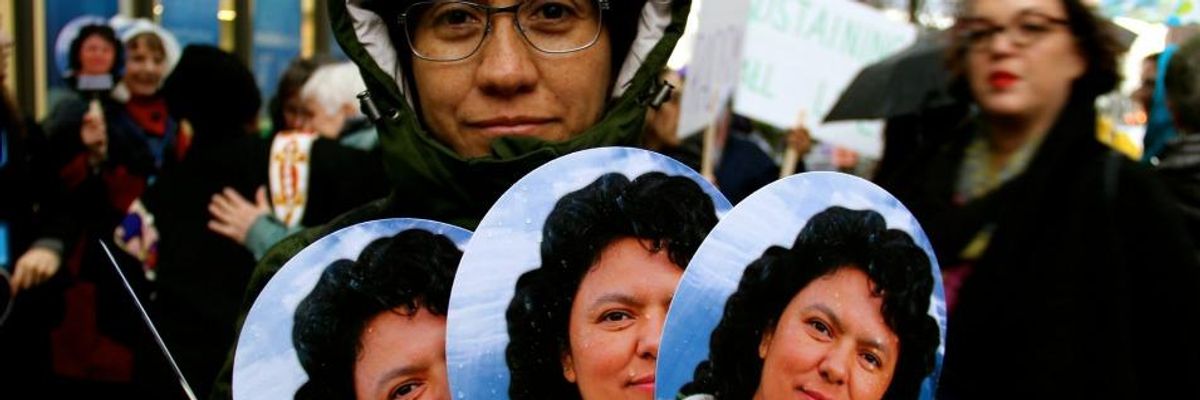April 22, 2016 marks the 46th Earth Day - the one day each year when all of us are encouraged to recognize our fragile planet and find ways to live a little lighter on the land. It is beyond platitude to say that every day should be Earth Day -- but it is a good day to recognize that, throughout much of the world, where people depend directly on lands, rivers, forests and soils, defending the environment is not a luxury; it is a necessity of survival.
In many places, basic human dignity often requires those who live closest to the land to fight, openly, to protect it. And, increasingly the bold actions of those on the frontlines of environmental protection lead them to be marginalized, criminalized, and even killed. Such was the case with Honduran environmental and indigenous rights activist Berta Caceres, who was killed early last month.
"As in Berta's case, most governments do little to investigate the attacks on land defenders, and the multinational interests involved are almost never held accountable."
Almost 7 weeks have passed since Berta's murder, and the Honduran government has no answers. Much like the more than 100 environmental activists that have been killed there since 2010, her case is unlikely to be solved. In 2014, the country's impunity rate was a shameful 96% according to Honduran NGO, Alliance for Peace and Justice. Yet, leaders claim the situation is improving and the murder rate is dropping. That's what former Foreign Minister Arturo Corrales told a group of NGOs assembled recently in Washington. A few days later he resigned his post after being linked to the murders of several police officials when he was security minister.
Berta had her life threatened at least 33 times since 2013. Many of the threats came directly from people affiliated with the construction of the Agua Zarca dam - a hydroelectric project being built to power the nation's growing mining sector. Yet the government never investigated the threats before her assassination, and didn't bother to search the dam owners' offices - DESA - until after 11 days had passed, on March 13th. When they did, they confiscated a cache of weapons.
All of this fits a pattern of criminal persecution of environmental and human rights defenders around the world: Indra Pelani, a young Indonesian who advocated for the rights of tenant farmers was killed in February 2015 while traveling to a rice harvest festival in Sumatra; Rigoberto Lima Choc, a Q'eq'chi Mayan activist, was killed last September after denouncing massive spill of toxic waste pollution in Guatemala's Peten region; Edwin Chota and three other indigenous Asheninka activists were killed in Peru in 2014 for vocally opposing illegal logging in the Amazon.
These are just a few individual names that, thanks to networks of environmental defenders, have made it into the headlines. Notably, these same networks, sparked into action following Berta's killing and led by COPINH, have forced the suspension of all financial flows to the dam project she fought - something they'd been trying to do for years, and tragically, only achieved in the wake of her death.
As in Berta's case, most governments do little to investigate the attacks on land defenders, and the multinational interests involved are almost never held accountable. In some cases, governments themselves threaten defenders of the land: in September 2015, for example, Ugandan President Museveni said he, "wanted bullets to kill those bad-hearted people," who oppose the vast oil palm plantations that are grabbing up land in that country.
It is well documented that land is being taken rapidly and at a vast scale from smallholder farmers and indigenous peoples for use by extractive industries, foreign investors and corrupt governments - all beholden to the profits to be extracted from the land, whether in oil, commodity crops, minerals, or energy. And in many cases, the economic forces that are gunning for control over local and indigenous peoples' territories that are quite literally gunning for the people themselves.
"Berta's life was dedicated to advancing human rights in Honduras. But, it was her spirit, devotion and commitment to the land and its people that drove her."
Thus, efforts to protect the environment in countries like Honduras must be fundamentally rooted in advancing human rights. This means not just protecting the physical lives of these activists: we need to ensure the protection of the indigenous cultures taking care of these lands to stem the rising tide of cultural genocide as well.
Berta's life was dedicated to advancing human rights in Honduras. But, it was her spirit, devotion and commitment to the land and its people that drove her. "I knew we would triumph, because the river told me so," she says in the video produced one year ago on the occasion of her acceptance of the Goldman Environmental Prize, the Nobel of environmental causes.
This Earth Day - as the world's governments celebrate the signing of the Paris Agreement and commit, on paper, to at least slow the rate of planetary climate crisis - let's begin to turn this brutal and painful loss for the world, into a bittersweet triumph. Let's recognize that in order to defend the earth, governments must do a better job defending her defenders.
The earth cannot afford to lose one more.

